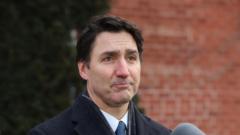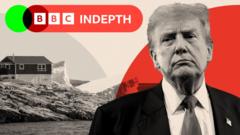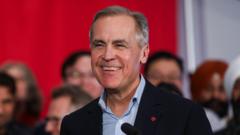In a surprise announcement, Canadian Prime Minister Justin Trudeau has declared he will resign, marking the end of his nearly decade-long leadership. Pressured from within his Liberal Party, Trudeau expressed that internal conflicts had impacted his ability to lead effectively into upcoming elections. In a statement aired during a press conference in Ottawa, Trudeau revealed he would remain in office until a new party leader is elected. The parliament will be prorogued until March 24, giving the Liberal Party time to organize its leadership transition.
Trudeau Bows Out: An Era of Leadership Ends in Canada

Trudeau Bows Out: An Era of Leadership Ends in Canada
Canadian Prime Minister Justin Trudeau announces resignation amid party pressures and declining popularity while ensuring a smooth transition.
Trudeau mentioned his desire for the country to have a clear electoral choice, emphasizing his struggles with internal party battles. His decision comes at a time when he has faced growing dissatisfaction from both the public and his party members, with calls to resign intensifying, especially after the unexpected departure of key ally and Deputy Prime Minister Chrystia Freeland.
Party president Sachit Mehra indicated that the search for a new leader would commence this week, while Trudeau's tenure has been characterized by various achievements such as improved child benefits and healthcare reforms. Nonetheless, he faced challenges, including rising unpopularity and a potential significant defeat for the Liberals in the upcoming elections, as signalized by their trailing position in polls against the Conservative party.
Historically, Trudeau's leadership has been intertwined with progressivism and inclusivity, including achieving a gender-balanced cabinet and efforts toward Indigenous reconciliation. However, scandals and public discontent surrounding issues such as housing affordability, pandemic responses, and economic strains contributed to his waning support, culminating in a mere 22% approval rating recently.
As Canada transitions to new leadership, some citizens have shown mixed reactions, with a few celebrating the end of his tenure, while others feel a sense of nostalgia. It remains uncertain who will step into the leadership role within the Liberal Party and what direction the newly chosen leader will take moving forward as they prepare for the general elections scheduled on or before October 20.
Trudeau's departure ushers in a pivotal moment for Canadian politics as the party navigates the challenges ahead without his guiding presence.
Party president Sachit Mehra indicated that the search for a new leader would commence this week, while Trudeau's tenure has been characterized by various achievements such as improved child benefits and healthcare reforms. Nonetheless, he faced challenges, including rising unpopularity and a potential significant defeat for the Liberals in the upcoming elections, as signalized by their trailing position in polls against the Conservative party.
Historically, Trudeau's leadership has been intertwined with progressivism and inclusivity, including achieving a gender-balanced cabinet and efforts toward Indigenous reconciliation. However, scandals and public discontent surrounding issues such as housing affordability, pandemic responses, and economic strains contributed to his waning support, culminating in a mere 22% approval rating recently.
As Canada transitions to new leadership, some citizens have shown mixed reactions, with a few celebrating the end of his tenure, while others feel a sense of nostalgia. It remains uncertain who will step into the leadership role within the Liberal Party and what direction the newly chosen leader will take moving forward as they prepare for the general elections scheduled on or before October 20.
Trudeau's departure ushers in a pivotal moment for Canadian politics as the party navigates the challenges ahead without his guiding presence.























